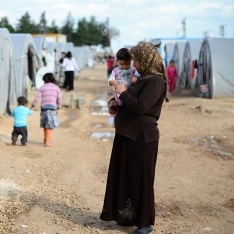Apr 26 2019
A ground-breaking wearable sensor to track new-born babies in poor areas is being built by Anglia Ruskin University, in partnership with professionals in Jordan.
 (Image credit: Anglia Ruskin University)
(Image credit: Anglia Ruskin University)
Academics will design wearable technology to exactly measure the respiratory rate in new-born babies, particularly for areas where healthcare access is poor.
Scientists became aware of the size of the issue during their work in the Zaatari refugee camp in Jordan, where they witnessed the effect that restricted access to respiratory monitoring impacted access to suitable healthcare.
According to the United Nations High Commissioner for Refugees, 60% of neonatal fatalities in the camp were related to preterm birth and its accompanying complication of respiratory stress syndrome.
This international joint project will build a wearable sensor that makes use of wireless communication to deliver nonstop remote monitoring of an infant’s breathing. This, in turn, will support quicker, more accurate identification of health disorders in newborns.
Inkjet-printing technology will develop stretchable and biocompatible sensors for the monitor, and the project team will collaborate closely with industry to guarantee the designs obey medical regulations and can be easily marketed.
The first week of life is crucial for new-born babies, and in low-income areas, access to appropriate healthcare is often limited. If a baby develops a problem, it can sometimes be too late before the issue is diagnosed. As a result, there is an increasing need for remote, low-cost, reliable, and comfortable respiratory rate sensors that provide physicians with accurate readings and to assess the health condition of newborns. We are developing a sensor which will be made of flexible and biocompatible materials with an attachment mechanism that avoids skin infection caused by traditional adhesive electrodes. We’re delighted to be working with our partners in Jordan to create this vital piece of technology. We believe it will have a real tangible benefit which can save the lives of vulnerable babies.
Dingchang Zheng, Professor, Anglia Ruskin University
Professor Zheng of Anglia Ruskin is partnering with Professor Ala’aldeen Al-Halhouli of the German Jordanian University as part of the UK-Jordan Industry-Academia Partnership Program being sponsored by the Royal Academy of Engineering, through the Newton Fund.